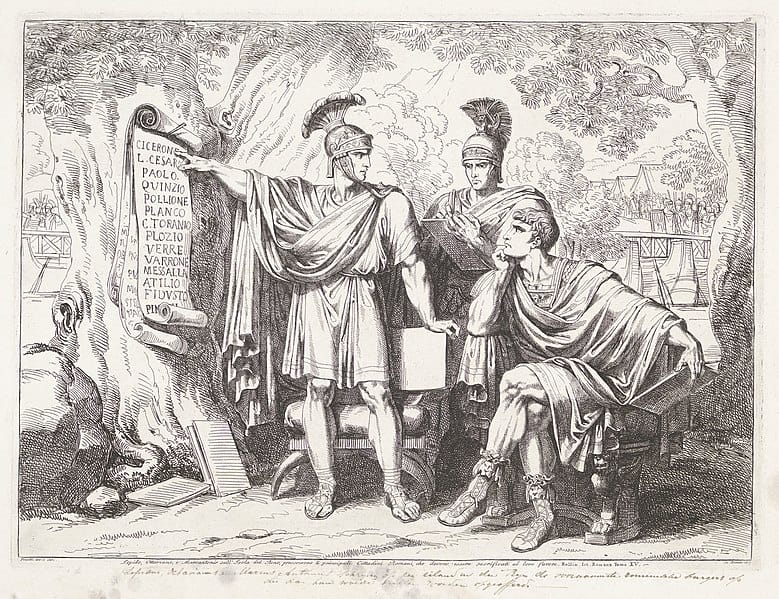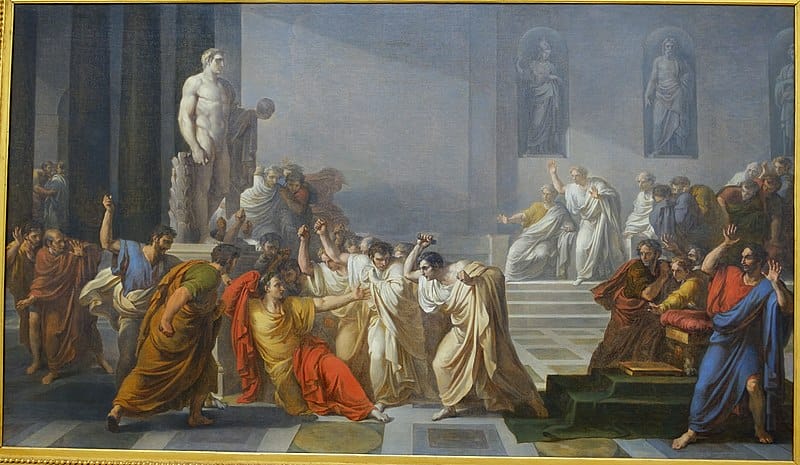Servilia Caepionis was a very important figure in the late Roman Republic. As the mother of Marcus Junius Brutus, one of Julius Caesar’s assassins, and the mistress of Caesar himself, her influence extended both personally and politically within the highest echelons of Roman society. Her family connections and political alliances positioned Servilia at the heart of the era’s political schemes, granting her a unique perspective and role during a turbulent time.
In a society where women’s power was often indirect, Servilia’s involvement in the political arena was noteworthy. Servilia Caepionis’s lineage, as a member of the distinguished patrician family, provided her with an extensive network that she could leverage. The legacy and historical perception of Servilia remain subjects of interest to scholars seeking to understand the complexities of her influence and the impact she had on Roman society and the civil wars that defined the end of the Roman Republic.

Key Takeaways
- Servilia Caepionis was a key figure in Rome’s political and social circles during the Late Republican Period.
- Her relationships forged important alliances that had significant political repercussions in the Roman Republic.
- Servilia’s legacy contributes to an understanding of women’s roles and influence in ancient Roman politics and society.
Biographical Background
Early Life and Family Connections
Servilia Caepionis was born into the patrician Servilii Caepiones family, a lineage decorated with consuls and military leaders. She was the daughter of Quintus Servilius Caepio, a notable figure of Roman nobility, and thus was enveloped in the upper echelons of Roman societal hierarchy from birth. Her lineage comprised notable members, including a paternal grandfather who was also named Quintus Servilius Caepio, a consul of Rome who became infamous for his ill-fated command during the Battle of Arausio.
The family’s prestige was further accentuated by Servilia’s relationship with her half-brother, Cato the Younger, a staunch defender of the Roman Republic’s traditional values. This connection would later be key, as her son Marcus Junius Brutus would follow in Cato’s footsteps as a key figure in the assassination of Julius Caesar.
Servilia Caepionis Marriages and Children
Servilia’s marital ties were just as influential as her birth family’s, revealing the strategic nature of Roman aristocratic unions. Her first marriage was to Decimus Junius Silanus, with whom she bore three daughters: Junia Prima, Junia Secunda, and Junia Tertia. Despite the lack of specific details on her life with Silanus, her daughter Junia Tertia’s marriage to Gaius Cassius Longinus, another of Caesar’s assassins, is indicative of Servilia’s storied bloodline and its intertwinement with Roman politics.
Through her children, the legacy and influence of Servilia Caepionis would echo through the pivotal moments of the Roman Republic. Notably, her daughter’s regal name, Servilia I, bespeaks the family’s adherence to traditional naming conventions, highlighting their patrician status.
Her role as the grandmother of Cornelia, the offspring of her daughter Servilia I, bolstered her status within the Roman aristocracy. As a matron figure, she adeptly managed her family’s prominence and the advantageous marriages of her children, cementing the dynastic power of the Servilii Caepiones.
Political Alliances and Influence
Servilia Caepionis was deeply involved in the intricate web of Roman politics through her personal relationships and her family’s prominence in the Senate. Her involvement impacted significant political events and figures, shaping the course of the Republic.
Relationship with Julius Caesar
Servilia Caepionis is perhaps most renowned for her enduring affair with Julius Caesar, a connection that extended beyond mere romantic entanglement, influencing the political landscape of Rome. Sources suggest that her relationship with Caesar was not only personal but also deeply intertwined with political maneuvering. Historical accounts indicate the possibility that Servilia may have used her influence with Caesar to secure favorable outcomes for her relatives, including her son, Marcus Brutus, one of Caesar’s eventual assassins.
- Affair Begins: Notably during the 60s BC
- Possible Political Benefits:
- Protection and favor for her family
- Insight into Caesar’s political strategies
Love Letter To Caesar
During a session of the Roman Senate, Julius Caesar received a letter. Marcus Porcius Cato, suspicious of Caesar and always eager to catch him in wrongdoing, demanded that Caesar read the letter aloud to the Senate. Caesar, reluctant but compliant, handed the letter to Cato.
When Cato read the letter, he found it was not a political document or evidence of conspiracy, but a love letter from his own sister, Servilia Caepionis, to Caesar. This revelation embarrassed Cato and exposed the personal tensions underlying their political rivalry.
Connections to the Senate
As a member of the patrician class, Servilia Caepionis was closely connected with the Senate. Her familial ties included prominent senators such as her half-brother Cato and her son Brutus, both significant political figures in their own rights. These connections put her in a unique position to influence the highest level of Roman power structures.
- Key Family Members in the Senate:
- Cato (Half-brother)
- Marcus Brutus (Son)
Involvement in Political Affairs
Servilia’s political influence extended to active involvement in critical political affairs of her time. Although the direct extent of her participation is debated by ancient sources, it’s clear that she navigated through tumultuous periods, such as the Civil War and the conspiracy surrounding Caesar’s assassination. Her engagement in politics is underscored by the association with Cassius and other conspirators—evidence of her capacity to shape events from behind the scenes.
- Noteworthy Events:
- Civil War: Navigating alliances and safeguarding her family’s interests
- Conspiracy: Connection to conspirators, including her own son and son-in-law
Impact on Roman Society and the Civil Wars
Support during the Civil Wars
Servilia’s influence extended into the Civil Wars, wherein she supported notable figures and was engaged in the power dynamics of the time. Servilia Caepionis maintained her relevance amid shifting allegiances and the evolving political landscape.

- Rivalries: Her connections allowed her to play a part in the political rivalries that characterized the era, including the Triumvirate and the opposition factions.
- Battle of Philippi (42 BC): Although it’s unclear to what extent she was involved, the consequences of the battle undoubtedly affected her family and her position in society. The aftermath of the civil wars saw the transformation of the Roman Republic into the Roman Empire, with significant societal changes.
Even after the civil wars, the legacy of figures like Servilia lingered. The decisions she made, including those regarding her estates and alliances, were reflective of her understanding of the sociopolitical climate of ancient Rome. Servilia’s life hints at the complex ways Roman matrons could shape their family’s fortunes and reputation, especially during eras of political turmoil.
Legacy and Historical Perception
Portrayal in Ancient Literature
Ancient texts give a varied view of Servilia Caepionis. Plutarch, a prominent Greek historian, mentions her in the context of her relationships with powerful men, including Julius Caesar. As the half-sister of Cato and the mother of Brutus, her family ties alone would necessitate her mention in historical records related to the late Roman Republic. Servilia is often recognized for her physical beauty and political influence. Her romantic liaisons with Julius Caesar and rumored involvement in political intrigue add to her historical prominence.

Modern Cultural Depictions
In modern times, Servilia’s legacy has extended beyond the historical texts to various cultural interpretations. These depict her as a woman who maneuvered skillfully within the constraints of her societal context. Historian Susan Treggiari has contributed substantial scholarly work that sheds light on women like Servilia Caepionis, providing nuanced perspectives absent in ancient accounts.
Adaptations in film and literature have broadened the scope of Servilia’s character, showcasing not just her beauty and romantic involvements but also her intelligence and resilience. She has been portrayed as a complex character in novels and television series, reflecting a modern fascination with her historical significance. Servilia’s portrayal reflects an evolving understanding of her role in history and her legacy as one of the prominent women in the backdrop of the Roman Republic.

People Also Ask:
What was the cause of death for Servilia?
The cause of Servilia’s death is not clearly documented in historical records. Given the lack of specific details, it is generally presumed that she died of natural causes, as was typical for someone of her era who lived past the age of reproduction and into middle age or later.
What is the relationship between Servilia and Atia?
Servilia Caepionis and Atia are related through Servilia’s half-brother, Gaius Octavius, making Atia Servilia’s niece. This familial connection places Servilia in proximity to the ruling Julii family, as Atia was also the mother of the future emperor Augustus.
Who is Servilia of the Junii?
Servilia of the Junii refers to Servilia Caepionis, a prominent woman in Roman society who was the daughter of Quintus Servilius Caepio and Livia Drusa. She is recognized for her political influence and her role in the historical narratives around the end of the Roman Republic.
Who portrayed Servilia Caepionis in the television series ‘Rome’?
In the television series ‘Rome,’ the character of Servilia is portrayed by actress Lindsay Duncan. Duncan’s performance brings to life the character’s political maneuvering and her personal complexities within the dramatized historical context of the show.
What was the nature of Servilia’s relationship with Julius Caesar?
Servilia is historically noted for her intimate relationship with Julius Caesar, which is believed to have begun around the time she was in her late 30s or early 40s and he was about six years younger. This connection not only placed her at the heart of Roman politics but also leaves open the question of influence on Caesar’s political decisions.
Is there any historical evidence that Brutus was the son of Caesar?
There is speculation but no definitive historical evidence to support the claim that Brutus, Servilia’s son, was fathered by Julius Caesar. The rumor is likely rooted in the closeness of Caesar and Servilia, but it remains one of the unresolved mysteries of Roman historical gossip. Brutus is most commonly recognized as the son of Servilia and Decimus Junius Brutus Albinus.
Hello, my name is Vladimir, and I am a part of the Roman-empire writing team.
I am a historian, and history is an integral part of my life.
To be honest, while I was in school, I didn’t like history so how did I end up studying it? Well, for that, I have to thank history-based strategy PC games. Thank you so much, Europa Universalis IV, and thank you, Medieval Total War.
Since games made me fall in love with history, I completed bachelor studies at Filozofski Fakultet Niš, a part of the University of Niš. My bachelor’s thesis was about Julis Caesar. Soon, I completed my master’s studies at the same university.
For years now, I have been working as a teacher in a local elementary school, but my passion for writing isn’t fulfilled, so I decided to pursue that ambition online. There were a few gigs, but most of them were not history-related.
Then I stumbled upon roman-empire.com, and now I am a part of something bigger. No, I am not a part of the ancient Roman Empire but of a creative writing team where I have the freedom to write about whatever I want. Yes, even about Star Wars. Stay tuned for that.
Anyway, I am better at writing about Rome than writing about me. But if you would like to contact me for any reason, you can do it at [email protected]. Except for negative reviews, of course. 😀
Kind regards,
Vladimir
